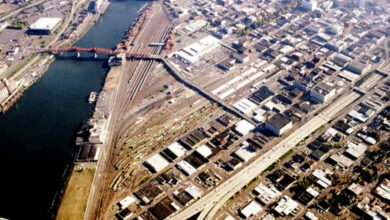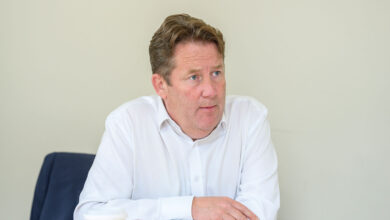Ireland lagging behind in the construction of apartment schemes

For years, various experts have held that the answer to housing supply shortages in cities lies with apartment construction. Certainly, where limited space exists, building up instead of out is difficult to argue with, write Paddy Smyth, Partner – Real Estate and Joanna Bannon, Senior Associate – Real Estate at Fieldfisher LLP.
In continental Europe, the vast majority of urban populations reside in apartments. Predominant features of European apartments are location, convenience, and amenities. Residents generally have access to amenities such as crèches, playgrounds, gyms, green areas, and car park facilities, all in proximity to shops and public transport.
The SCSI Cost of Apartment Delivery report, published in January 2021, provides figures on the cost of delivering various categories of apartments to the Irish market. The report indicates that apartments are more expensive to develop compared to houses, and that the viability of a project depends on the sale value exceeding the total development cost. In most instances, the cost of building apartments is greater than the market value of a unit attainable by owner-occupiers. The report highlights that the construction of buy-to-rent schemes are more viable than buy-to-sell developments, partially due to reduced amenities for the latter type.
Additional factors influencing unit price include hard building costs driven by structural features of apartments, followed by building regulations and energy rating regulations. The feasibility of such projects also becomes more complex and costly due to the (essential) requirement that multi-unit developments be more heavily regulated than housing developments, as well as the need to secure sufficient levels of funding.
There is a pressing need to address these issues which are causing a low output of apartments in Ireland to the owner-occupier market.
An introduction to the scheme
On 10 May 2022, the Department of Housing, Local Government and Heritage published an outline of the Croí Cónaithe (Cities) Scheme. The scheme, seen as necessary under the Government’s Housing for All plan, is a fund which aims to support the construction and sale of apartments to owner-occupiers. The scheme involves use of the funds to bridge the cost of development and bringing to market of each unit, and the market sale price. It is argued it will encourage compact growth in vibrant, liveable cities in addition to reducing vacancy and dereliction.
The Department estimate some 70,000 planning permissions remain un-commenced across Dublin, Cork, Limerick, Galway and Waterford as a direct result of the viability gap. The Scheme will benefit from a €450 million fund earmarked for the Croí Cónaithe (Cities) Scheme and an additional €50 million for Croí Cónaithe (Towns) Scheme, a separate scheme providing grants between €30,000 to €50,000 for refurbishment of derelict properties.
It is proposed that the funding support be payable at the point of final conveyance to the eligible owner-occupier. It is further proposed that the Scheme will be managed and administered by the Housing Agency on behalf of the Department.
Development eligibility
The Department outlines the following criteria for development eligibility:
- Located within Dublin, Cork, Limerick, Galway, or Waterford;
- Four storeys or higher and minimum net density of 35 dwellings per hectare;
- Close to public transport and amenities;
- Must be sold to owner-occupiers;
- Demonstrable viability gap; and
- Development has full grant of planning approval but must not have commenced construction at time of submission (an exemption for multi-phased developments exists).
Should a development meet this criteria, it will be ranked based on date of delivery, quality of development, density and delivery cost per apartment in addition to core services and amenities. Proposals will then be subject to detailed due diligence and an open book assessment to ensure that the funding support provided feeds through in reduced acquisition cost for the ultimate owner-occupier. The requirement of open-book accounting may be challenging for financed developments where the financial details are required by banks to be kept confidential.
Eligibility of purchasers and costs
It is intended that eligible developments will be available openly to any purchaser(s) to live in themselves, or to jointly purchase one of the designated apartments under the scheme with the expressed intention of occupying the apartment as their normal place of residence. The purchaser will be required to provide a statutory declaration to this effect and will only be entitled to one apartment supported by the scheme.
Individual unit market prices will be determined following the due diligence process and both delivery costs and market values will be assessed by independent quantity surveyors and valuers appointed by the Housing Agency. While the level of funding will be dependent on the viability gap for each apartment, this will be calculated and fixed closer to the date of delivery. The Government anticipates maximum funding for each apartment to be in the region of €120,000 with exceptions of an additional maximum of 20 per cent in regional cities where market prices result in a larger viability gap.
Conclusion
The scheme is a welcome initiative, providing workable solutions to some of the key barriers currently depressing construction of build-to-sell apartments. It will not only contribute to the increase of the housing supply but will have an important role in shifting society’s perception of apartment living. If implemented efficiently it should assist in re-balancing city centre demographics, making them affordable places to live for all sections of society. Good planning and meeting amenity requirements in the proximity of developments will play an important role in winning society’s approval and will directly contribute to creating sustainable communities in our urban areas.

T: 01 8280 684
E: joanna.bannon@fieldfisher.com
W: www.fieldfisher.com





